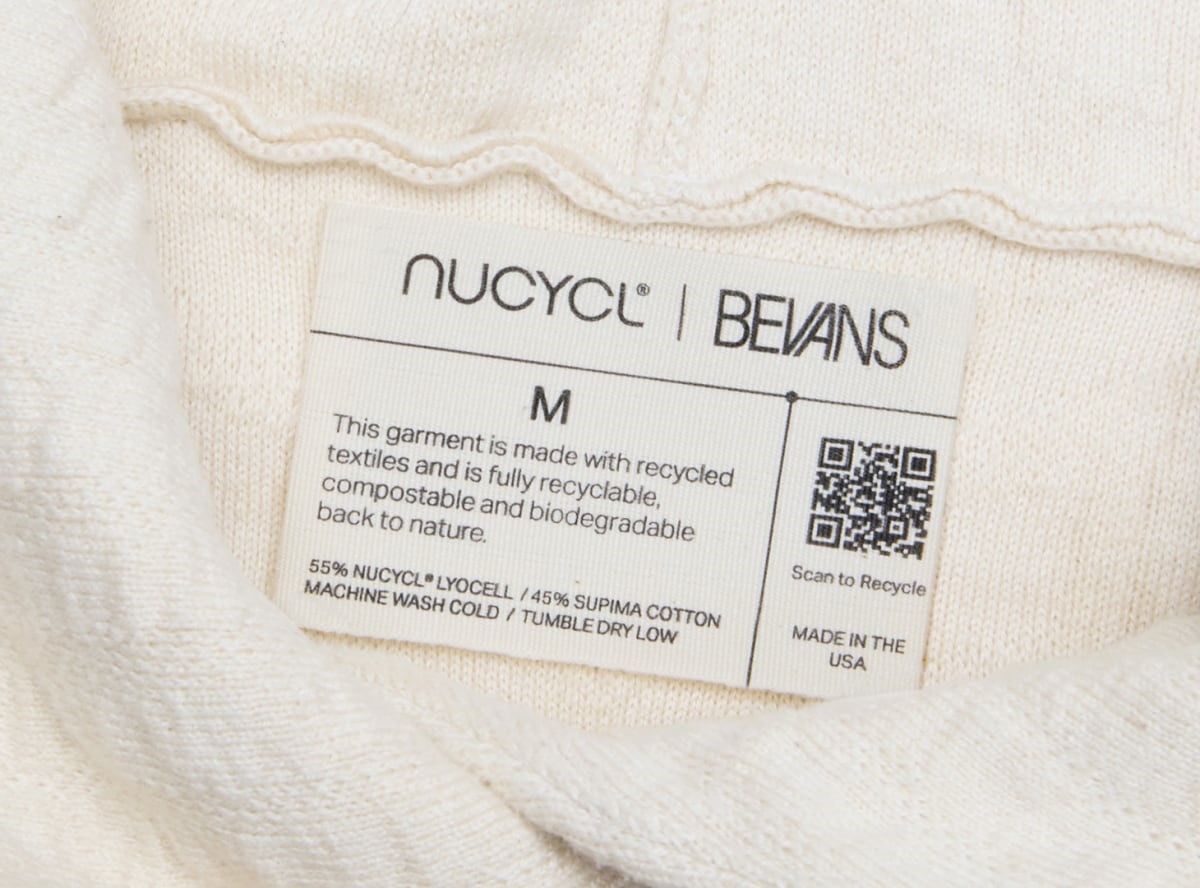This $600 hoodie is made from cotton waste. It might be the future of fashion
Menswear designer Christopher Bevans has created red carpet looks for Jay-Z, Prince, and John Legend. But these days, he’s focused on the fibers inside the garment he creates, not just how eye-catching they are.
Today, he’s dropping a simple cream-colored hoodie made in partnership with Evrnu, a startup that creates new fibers out of cotton waste. The hoodie, which is available for $600 on Evrnu’s website, is made from Nucycl, a material that is compostable, biodegradable, and infinitely recyclable.

Evrnu is among a wave of startups—including Renewcell, Circ, and Syre—trying to curb the fashion industry’s terrible impact on the planet by making recycled fibers that are as effective and affordable as virgin materials. This year, Evrnu plans to open its first commercial facility in South Carolina, fueled by $31 million in funding and $500 million in purchase commitments.
Bevans is eager to use his clout to support Evrnu’s efforts to grow. He’s the first of several designers that is partnering with the startup to create garments from the Nucycl. “I’ve traveled the world and been inside many factories,” says Bevans, who has designed for Nike and Eddie Bauer, and founded his his own label, DYNE. “I’ve seen so much wastage. Recycling capabilities are here, and it’s time for us to push the industry to adopt them.”
We’ve seen how difficult it is for fabric recycling startups to scale. In recent weeks, one of Evrnu’s biggest competitors, Renewcell, declared bankruptcy after it failed to get enough orders from brands to keep its newly built factory going. Stacy Flynn, Evrnu’s founder and CEO, hopes to avoid this fate, but she acknowledges that it will depend on consumers and brands supporting its work.

The Recycling Solution
The fashion industry pumps out a gargantuan number of clothing every year; estimates range between 80 billion and 150 billion units. This figure is likely to only increase as ultra-fast fashion brands like Shein and Temu flood the market with thousands of new styles a day. Creating this many pieces of clothing means extracting raw materials from the earth, including cotton and petrol, which depletes natural resources and generates carbon emissions.
Fabric recycling is an important tool to curb this impact. Flynn, a fashion industry veteran, decided to launch Evrnu a decade ago. She partnered with Christopher Stanev, a textile engineer, to figure out a way to use chemistry to liquify fabrics then recreate its constituent fibers. While their technology works across many different materials, Flynn has strategically focused on cotton because it is biodegradable and does not cause the kind of microplastic pollution caused by synthetic fibers like polyester and nylon. (Cotton also makes up about a third of all materials in the fashion industry.) “We want to find a solution that can move us away from our dependency on petroleum-based polymers,” she explains.
The technology to transform old textiles into new ones has been around for years. Now, the challenge is scaling the operation to help the industry pivot away from virgin fibers and also bring the price of their reconstituted textiles down so they can compete with cheaper virgin fibers. This involves getting brands to invest in ordering more of these more sustainable materials. Over the past few years, several brands have created capsule collections using Nucycl, including Levi’s, Stella McCartney, and Zara. But now, Evrnu needs to pivot beyond small pilots to enough orders to keep its factory going.
This is no easy task. Renewcell had secured $10.6 million in venture funding over the last 12 years to establish its operations in Sweden. But it didn’t have enough revenue to stay in business. For many sustainable fashion advocates, Renewcell’s bankruptcy was a major blow, as well as an indictment on fashion brands, which often market themselves as sustainable but weren’t willing to support Renewcell by buying its material.

The Struggle To Scale
Flynn knows it will be an uphill battle to get Evrnu off the ground. For one thing, clothing brands tend to be very price sensitive, and Nucycl’s fibers are slightly more expensive than virgin cotton. (They add a few cents to a few dollars to the final price of a garment.) “One thing we hear from brands and retailers is that consumers won’t pay more,” she says. “The fast fashion business model is based on buying low and selling high. And nobody wants to change it because they’re terrified they won’t hit their sales numbers.”
Flynn believes that the industry is underestimating consumers’ desire for change. It’s now clear that cheap fashion is adversely harming the planet and even our health. And Flynn believes that if Evrnu pitches itself as an upgrade—a higher quality, better fiber—some consumers will gravitate towards it, even if it costs a little more.
Part of creating consumer awareness comes down to partnering with well-known brands and designers to create products using these materials. This is where the Christopher Bevans collaboration comes in. The goal of this partnership was to show exactly how Nucycl looks and feels in everyday clothing. Creating a hoodie with him was a deliberate decision. “We wanted someone who would help us take this technological marvel and turn it into something that people would actually love and wear against their skin,” she says. “Christopher came up because he’s a talented streetwear designer who can make an incredible hoodie.”
In the months to come, Evrnu will partner with other designers to show how Nucycl works across lots of different types of garments. “I think it’s going to take smaller designers and smaller brands to show what is possible from a consumer perspective, and pave the way for the bigger brands to come on board,” Flynn says.
Evrnu is not alone in its quest to make recycled materials more affordable and widely available. Another startup called Circ is trying to do this with recycling polyester-cotton blends, which make up the majority of textiles on the market. It has raised more than $30 million to build an industrial scale facility in Virginia. H&M has committed to investing $600 million over the next seven years in Syre, a polyester recycling startup that is building a production plan in North Carolina.
Flynn believes that the success of these fledgling brand depends a lot on consumers willing to change their behavior. While some sustainability advocates believe that it will take government regulations to curb the impact of the fashion industry, Flynn believes that consumers can—and will—come around to paying more for more sustainable materials. “Consumers are the most important stakeholder in the whole systemwide equation,” says Flynn. “If consumers don’t buy, you don’t have a business. And I think the collateral damage associated with fast fashion is now coming to light and consumers are ready for change.”
(18)



